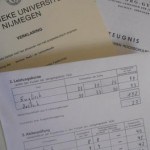
Copyright Iolante Ltd 2016
Translating qualifications, diplomas, school certificates, degrees etc. is different from ‘normal’ translations. The reason is that the education systems in the various countries, the subjects on offer and the marking schemes are different. Therefore it is not possible for translators to simply translate these concepts into another language.
The difficulties of translating qualifications obtained from secondary schools abroad
When students in Germany leave secondary school with the highest possible qualification, they have earned their Abitur. If you need an English language translation of your Abitur, things get rather complex. The same level of qualification is called A’ Levels in England, Wales and Northern Ireland and Scottish Highers in Scotland. In the USA, High School leavers take AP‑examinations, in New Zealand, they sit Level 3 tests.
It is therefore not possible to translate “Abitur” as “A ‘ Levels”. Not only is the name of the qualification different, the structure and content also vary considerably. The German qualification is the result of a complex calculation of coursework and exams students sat during a 2-year period in at least 9 subjects. The final results include maths and a modern foreign language. Additionally, the results include special final exams in 4 subjects taught in more depth than the others. German students have “Abitur” with an average grade. Students in England, Wales and Northern Ireland generally study 4 subjects in year 12 and 3 subjects in year 13. They end up with individual A’ Levels in each of those subjects. Each subject has an independent grade and there is no single final grade.
In conclusion, while similar, the various qualifications are not identical. Therefore, translators cannot translate this type of text with the same high degree of equivalence as they aspire to with other texts. The solution is to translate these qualifications in a descriptive way as Higher Education Entrance Qualifications. Because that’s the one thing they all share – they allow students to apply for a place with any institution offering tertiary education.
Translating university degrees
Translating university degree courses and qualifications is even more complicated. Some courses are 3 years, others 4, many German courses are at least 5 years, although students may take longer. Course content varies, the system for final examinations vary… it is impossible to find 1:1 equivalents. And, although many European countries are now introducing BA and MA qualifications, the translator cannot assume that the content of these courses is the same in all countries.
In this case, the solution is to leave qualifications in their original language (BA, MA, PhD), offering an explanation in brackets.
When translating qualifications translators are not qualified to judge their quality. With education systems ever-changing, what is equivalent today may no longer be so tomorrow. A degree from the 1990s is probably quite different to one with the same name awarded in 2010.
Translating grades
The translation of grades is equally complicated.
Again, looking at secondary school grades, Grades in England, Wales and Northern Ireland used to run from A* to G and U (unclassified) at GCSE level. In September 2015 they were changed to run from 9-1. A ‘level grades in the same countries run from A* to E (with a U for unclassified). For the purpose of applying for higher education, course providers convert these grades into UCAS points from 600 down to 240.
German grades at GCSE equivalent run from 1 (highest) to 6 (fail). The A’ Level equivalent starts at 15 points (highest) and finishes at 0 point. The system to work out an average is very complicated. On the school leavers’ certificate, a scale of 1.0 (best grade) to 6.0 (lowest) shows the grades achieved.
This is not the only thing that makes it impossible for a translator to convert grades from one system to the other. Grade boundaries are another factor. Professional translators do not know what standard a student needs to achieve a particular grade. It would be wrong to simply equate A with 1, B with 2, C with 3 etc.
The only solution is to leave all grades untranslated.
Who compares? UK ENIC.
All countries have their own authorities for comparing and certifying the equivalence of qualifications and grades. In Britain, this is UK ENIC (formerly UK NARIC).
UK ENIC offer their own service of translating qualifications. However, they are happy to accept certified translations done by professional translators. For a fee, they will then compare and confirm the equivalence and the value of school leavers’ qualifications, tertiary education qualifications, vocational qualification etc.
ENIC have recently introduced a “translation waiver service” that certifies the equivalence of qualifications for use in Great Britain without the need for a certified translation
Where can you find more information?
Visit our certified UK translation page for more information on the process of certifying translations for use in the UK and beyond. Contact me if you are looking for a qualified German translator to help you with your English or German language certificates.
“Ich bin grade dabei mir die Übersetzungen anzuschauen und bin sehr beeindruckt von Ihrer ausgezeichneten Übersetzungskompetenz (insbesondere angesichts meiner aktuellen schockierenden Erfahrungen mit einer Übersetzungsfirma, die ich mit dem Übersetzen meiner Zeugnissen beauftragt habe…).
Vielen Dank für Ihre Top-Leistung!Einen ganz herzlichen Dank für Ihre ausgezeichnete Übersetzung, aber auch für die sehr angenehme Zusammenarbeit. Es hat mich sehr gefreut, mit einer Fachfrau zu tun zu haben, die ihre Arbeit und ihre Kunden sehr ernst nimmt!”
Galina Filipkova, die die Übersetzung von Abschlusszeugnissen zur Ausbildung als Lehrerin für Englisch und Deutsch in der Sekundarstufe I und II, sowie einiger Arbeitsreferenzen in Auftrag gegeben hatte.
